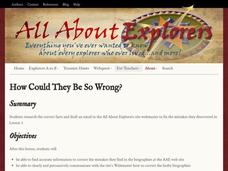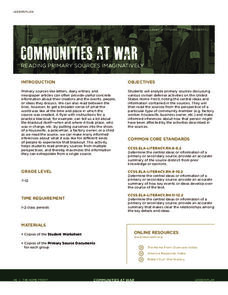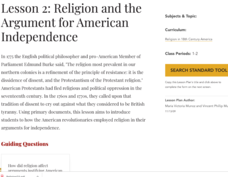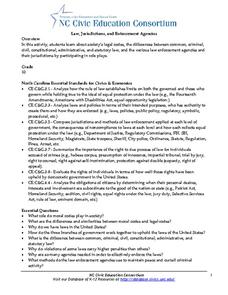Alabama Department of Archives and History
The Effect of the Great Depression on Children and Education
What was it like to be a kid growing up during the Great Depression? Academics study primary sources to analyze the effect of school closures on children during the Great Depression. They then participate in group discussions and writing...
Carolina K-12
Revolutionary War Era Tick-Tack- Toe
So many fantastic activities on the American Revolution! From drawing political cartoons illustrating events of the Boston Massacre to writing a diary entry as a shopkeeper during the Boston Tea Party, your young historians will...
John Wiley & Sons
Build a Pyramid
Learners discover fascinating facts about the Great Pyramid of ancient Egypt and construct a scale model of the pyramid with this fun activity worksheet.
North Carolina Consortium for Middle East Studies
The Importance of Holocaust Remembrance
Designed as the culminating activity after a unit study of the Holocaust, class members assume the voice of a world leader, write a speech, and participate in a simulation of the Stockholm International Forum on the Holocaust.
PBS
The Diary of Anne Frank
While designed to supplement a viewing of the PBS Masterpiece Classic The Diary of Anne Frank, this resource can also serve as an excellent informational text and activity source for your students on the historical context and timeline...
Arizona Department of Education
Be Independent / Life Management Skills
Living independently is about more than managing money. Learn how to manage time, balance responsibilities, and calculate overtime and income with a set of activities about life management skills.
All About Explorers
How Could They Be so Wrong?
If it's on the Internet, it must be true ... right? Introduce young Internet explorers to the importance of fact-checking through a fun web-based activity. Pairs work together to read and analyze biographies about world explorers, then...
Carolina K-12
The Twenty-Sixth Amendment and the Power of Youth
Empower teenagers to take political matters into their own hands! After completing an engaging warm-up activity, class members discuss both sides of the youth voting issue, learn about the connection between military history and the...
Smithsonian Institution
John Brown’s Legacy
So who exactly was John Brown? John Brown fought for abolition during the Civil War. Scholars learn all about his legacy through the variety of activities in the sixth of 15 lessons, including viewing and analyzing primary source...
National WWII Museum
Communities at War: Reading Primary Sources Imaginatively
Uncle Sam wants you to support the troops. Learners use an engaging lesson plan to analyze primary and secondary sources to discover what life was really like for American citizens at home during WWII. Pupils complete worksheets, group...
American Battlefield Trust
John Brown
How did the raid on Harper's Ferry contribute to the start of the Civil War? Curated for high school historians, the activity explains John Brown's contribution to the start of the Civil War by using violence to demand an end to slavery....
National Endowment for the Humanities
“From Time to Time”: Presidents and Communicating with the Public
While the Constitution requires a "State of the Union" address, it doesn't give many details. In fact, it wasn't until Woodrow Wilson that the periodic update to Congress was given in-person. Using primary sources, recordings and...
National Park Service
Lesson 1: Journaling with Songs of Freedom
There's more to music than a memorable tune. The songs of those who were enslaved reveal the harsh realities of their lives. Using both songs and slave narratives, historians uncover this hidden history. The lesson incorporates a variety...
National Park Service
Lesson 6: Researching Contemporary Slavery
While many believe slavery ended after the American Civil War, it continues today in various forms. Using a WebQuest research project, class members investigate how the institution of slavery lives on in the modern world. Activities also...
National Endowment for the Humanities
Lesson 1: The First Great Awakening
High schoolers examine the First Great Awakening and how it affected religious belief in colonial America. They read and analyze primary source documents, explore various websites, and write a five-paragraph essay examining the beliefs...
National Endowment for the Humanities
Lesson 2: Religion and the Argument for American Independence
Young scholars examine how religion affected arguments justifying American independence. They read and analyze primary source documents, and write an essay analyzing how Americans used religious arguments to justify revolution against a...
National Endowment for the Humanities
The New Order for "Greater East Asia"
Sometimes the New Order becomes synonymous with its implications for European countries, but what about its consequences for East Asia? The final instructional activity in a four-part series teaches scholars about World War II. High...
Curated OER
How Do You Like to Learn?
Use this worksheet to gather insight into the types of activities assignments that each of your students prefers, and create an effective, student-centered learning environment.
Curated OER
The Enlightenment: Matching Activity 4
Just finished reading about the 17th century and the period of Enlightenment? Use this helpful worksheet that covers the people and events your class has just read about. Learners can use this resource to match ten different...
Student Handouts
Voting Rights Speech Before Congress
Is your class studying civil rights? Consider taking a look at President Lyndon B. Johnson's voting rights speech. This resource includes an abridged version and three related questions. Pupils consider Johnson's use of language and the...
Carolina K-12
Turn of the Century Immigration
In an engaging simulation, class members imagine immigrating to the United States in the late nineteenth century and arriving at Ellis Island. They then write creative journal entries about their experience and chart their journeys.
Carolina K-12
Law, Jurisdictions, and Enforcement Agencies
How do you determine what law enforcement agency has jurisdiction when a crime has been committed? That's the challenge facing class members in this role-play activity.
Center for Civic Education
Becoming an Informed Voter: Creating Initiatives
Continuing from a previous lesson on how to read and analyze proposed legislation on election ballots, your class members will now practice writing up their own proposals for a new school rule or local ordinance that will be discussed...
Student Handouts
Timeline Worksheet
Don't let your pupils waste another second drawing out lines for your next timeline assignment. Pass out this worksheet and get straight to the main activity!

























